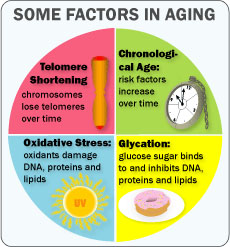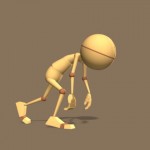
Australia has an aging population, but I believe that age is not about how many candles are on your cake- it is about the health of your body and your mind. There is a local couple in their nineties that still play golf at the McLeod Golf Club! Is this just good genes, or do we have some control over our future health? What causes us to age anyway?
There are many factors behind aging, but the 3 most important ones are oxidative stress, glycation, and telomere shortening.
Oxidative Stress
The body uses oxygen for energy production. However, the process of oxidation in the body causes free radicals, which can cause damage to the cells. So free radicals are naturally produced by the body, and while we can cope with some free radicals, too many causes problems. Free radicals are also caused by stress, poor diet, alcohol, smoking, pollution, pesticides and many other chemicals, radiation, inflammation, and infections.
Free radicals react with our cell membranes and other structures such as DNA, lipids and proteins by stealing electrons from these molecules and causing damage. When a free radical attacks these essential molecules, they change into free radicals themselves, causing a chain reaction that can cause the destruction of the cell.
Free radicals can cause:
Antioxidants are able to neutralise free radicals by giving their own electrons to them, preventing this damage. After neutralising a free radical, antioxidants become inactive,
which means they need to be constantly re-supplied to our bodies through the right foods and supplements.

Glycation occurs when the sugar from what we eat chemically binds to some of our DNA, proteins and fats, leaving them unable to do their jobs. This problem becomes worse as we get older, causing body tissues to malfunction, resulting in disease and death.
Telomere shortening
Telomeres have been compared with the plastic tips on shoelaces, because they prevent the ends of our chromosomes from fraying and sticking to each other. This would scramble our genetic information, causing cancer, other diseases, or death.
Yet, each time a cell divides, the telomeres get shorter. When they get too short, the cell can no longer divide and becomes inactive or dies. This process is associated with aging, cancer and a higher risk of death. So telomeres also have been compared with a bomb fuse.
In human blood cells, the length of telomeres ranges from 8,000 base pairs at birth, to 3,000 base pairs as people age, and as low as 1,500 in elderly people. (An entire chromosome has about 150 million base pairs.) Each time a cell divides, an average person loses 30 to 200 base pairs from the ends of that cell’s telomeres.
Cells normally can divide only about 50 to 70 times, with telomeres getting progressively shorter until the cells become inactive, die or sustain genetic damage that can cause cancer.
(Telomeres do not shorten with age in tissues such as heart muscle, in which the cells don’t continually divide.)
Geneticist Dr Richard Cawthon and his colleagues at the University of Utah found that in people over 60, those with shorter telomeres were three times more likely to die from heart disease and eight times more likely to die from infectious disease. Other recent studies have linked telomere length to an array of age-related conditions, including cardiovascular disease, diabetes, osteoporosis, cancer, and Alzheimer’s.
Anti-Oxidants
These help stop the damage to DNA and cells from free radicals caused by oxidation in the body.
Most antioxidants come from plants and include vitamins A, C and E and carotenoids such as beta-carotene, minerals, phenolic compounds and other natural chemicals. Flavonoids are another powerful antioxidant and are contained in red wine and tea.
While good vitamin supplements containing antioxidants are available, it is also important to eat a variety of natural foods – fruits, vegetables, cereals, legumes, nuts, seeds and wholegrains – to help supply your body with a good range and quantity of antioxidants.
Some good antioxidant sources are:
Beta-carotene – orange foods such as carrots, pumpkin, apricots, sweet potatoes and some leafy greens such as kale.
Lutein – green, leafy vegetables such as spinach.
Lycopene – tomatoes, watermelon, papaya.
Selenium – rice and wheat.
Vitamin A – carrots, sweet potato, milk, egg yolks.
Vitamin E – almonds, vegetable oils, mangoes, nuts, broccoli.
Vitamin C – available in many fruits and vegetables such as parsley, broccoli, berries, oranges, cauliflower, kale.
In one study, scientists exposed worms to 2 antioxidants, and the worms’ lifespan increased an average of 44%.
Reduce Things that Cause Free Radicals
As mentioned earlier, these include poor diet, alcohol, smoking, pollution, pesticides and many other chemicals, radiation, inflammation, and infections.
Reduce Your Sugar Intake
This will reduce the level of glycation in your body, allowing the DNA and tissues to work more correctly.
Detox
Getting rid of accumulated chemicals and toxins in the body can reduce damage to the cells and help them to function more correctly. (However, to be effective, a detox should always be done under the direction of a health care professional such as a naturopath.)
Address Chronic Stress
For the sake of your physical and mental health and wellbeing, have a regular activity that reduces your stress, such as exercise, meditation, walking, or massage.
Address Chronic Health Problems
Long-term health problems cause a much higher level of free radicals in the body, especially those involving inflammation or infection, such as allergies. Please ask about treatment for any chronic problem at the clinic.
Healthy Diet and Lifestyle
An enzyme called telomerase keeps telomeres from wearing down too much. A healthy diet and lifestyle, plus quality supplements, helps with telemerase activity, and combining several healthy habits may magnify the benefits. In one study, men with prostate cancer who meditated and used other relaxation techniques, ate a low-fat diet including whole grains, walked 30 minutes 6 days a week, and took supplements of fish oil and vitamins C and E, boosted their telomerase activity by 29 to 84%.
Geneticist Dr Cawthon has said that if all the processes of aging could be eliminated and oxidative stress damage could be repaired, “one estimate is people could live 1,000 years.”
While we can’t offer you this yet, with the right nutritional support and treatments, we may be able to add many years of good health to your life. Imagine if you were given a car at birth, and told that this was the only one you would ever have your entire life, and that spare parts were very difficult to get – how well would you look after it? Your body is your most important physical possession. If you are interested in keeping your body younger for longer, retaining your mental clarity, and avoiding the sort of health issues that your parents or grandparents suffered, we can help out. We have created an Anti-Aging and Longevity program which is tailored to your individual requirements. If you would like to find out more, please ask for a free 10 minute phone consultation with Peter Mills, Head Therapist at the clinic.

Depression affects individuals differently, however some of the more common signs and symptoms are:
Behaviour
Feelings
Thoughts
Physical
It is important to remember that these symptoms are a normal part of life’s lows, however the more symptoms you have and the longer they have lasted, the more likely it is that you are dealing with depression. Brisbane based CNTC believe that it is best to seek help before the symptoms become overwhelming and disabling.
Long-term difficulties are more likely to cause depression, however if you have had significant bad experiences in your past, you may become depressed more easily. As a Brisbane clinic treating depresssion we often find experiences that include relationship difficulties, long-term stress at work, prolonged isolation or loneliness, and long-term unemployment as contributing causes. Then, if life starts becoming difficult (e.g. loss of job, illness, or relationship breakdown), depression may develop. Personal factors, including your family history, personality, serious illness, or substance use, can also contribute to depression. Everyone is different, but usually there is a combination of factors involved. It is important to recognise the signs and symptoms, and seek help to minimise the impact on your health and wellbeing.
One school of thought is that depression is due to a chemical imbalance in the brain, usually triggered by physical or emotional trauma. However, sometimes there are a number of factors in the body which can also cause depression or make it worse.
If you are feeling down for an extended period of time, it is important to seek professional help. If diagnosed by a medical doctor with depression, you may like to complement their recommended treatment with any of the natural healing alternatives available to you.
Depression and Psychology: A psychologist uses a number of discussion techniques to help the person resolve their feelings and understand how they came to be depressed in the first place. The client is encouraged to analyse their own patterns and behaviour. A good psychologist will give their patient hope, and increase feelings of self-esteem and awareness. If the client is referred by a doctor, the psychologist will liaise with their doctor to ensure the best care for the client. For chronic conditions, a doctor may authorise some psychology sessions to be covered by Medicare.
Depression and Naturopathy: Those with depression are often found deficient in many essential vitamins, minerals and other nutrients. These individuals are also likely to have irregular eating patterns and an affected appetite, making a good diet all the more important. By improving the chemistry of the brain, our Brisbane naturopathy practitioners can often make a major difference to a person’s mental and emotional wellbeing.
Depression and massage: Massage therapy is one of the oldest treatments in the book when it comes to treating depression. It does so by relieving physical and emotional stress in the body, leaving the person feeling healthier and more confident in their ability to cope.
Depression and Acupuncture: Acupuncture can help with depression that is related to chronic pain by managing the underlying pain.
Mental Health Week raises community awareness about mental health issues, and is held in Brisbane in October each year to coincide with World Mental Health Day on 10 October. In 2013, Queensland’s Mental Health Week will be held from Sunday 6 to Sunday 13 October.
If you are interested in finding out about possible treatments for depression, anxiety, stress or any other mental health condition, please contact our Brisbane Clinic on 3376 6911, and ask for a free Comprehensive Health Assessment. We can then see what factors are involved in your condition, and recommend which therapy would be most effective for you.

Your adrenals produce adrenaline, which is part of your body’s emergency response system. If a tiger jumps out at you from behind a tree, your heart suddenly beats faster, your breathing gets faster, various muscles will tighten, your blood sugar levels rise, and non-emergency systems in your body are suppressed (such as your digestive system). Your body is now in ‘fight or flight’ mode. This is great for emergencies, but if your body gets stuck in this mode, it will eventually make you feel very run down, and it doesn’t seem to get much better no matter what you do. (In the long run, it can also put a strain on your heart, and increase your chances of developing diabetes).
The main symptom of adrenal exhaustion is constant tiredness, but because the body gets very run down it can often cause stress, irritability, depression or anxiety. The immune system is very sensitive to your energy levels, so immune weakness, allergies, or auto-immune diseases can develop. Adrenaline is part of your hormone system, so adrenal exhaustion can also cause all types of hormone imbalances, including PMS, menopause symptoms, thyroid problems, or low libido. Poor sleep and digestive problems are also very common symptoms.
Adrenal Exhaustion is a quiet health epidemic that is becoming increasingly common. In fact, it may surprise you to learn, that adrenal exhaustion is an underlying factor in all illnesses. Adrenal exhaustion is often caused by an overly stressful and busy lifestyle. The links between problems with the adrenal gland and excessive stress are well know but recent research also suggests they can be exasperated by poor diet, caffeine and smoking. Because adrenaline is the body’s ‘fight or flight’ hormone, the body is very sensitive to there being too much or too little of it in the blood stream. Almost any type of stress, whether it is physical or psychological, will cause an increase in adrenaline levels.
In this fast paced age, we hear that every minute counts. Day after day, week after week, all this pressure to achieve, meet goals, finish daily tasks, begins to build up inside of us until one day we are locked in the throes of time pressure. A chief contributor to time pressure is emotional identity. This happens when you invest a great deal of mental and emotional energy in a situation. All that energy can create tunnel vision, leaving you unable to see or appreciate other important things in your life. When someone or something interferes with that focus, the result frequently is irritation, anxiousness and frustration, especially when deadlines must be met.You push people away, neglect other areas of your life, but still proceed until eventually you lapse into emotional chaos. In the end, time pressure can seriously damage not only your relationships and quality of life, but even the situation in which you buried yourself to the exclusion of all else. Time pressure takes a toll on our nervous, immune and hormonal systems, and left unattended will likely produce cycles of anxiety, fatigue and temporary despair. As this process continues it makes us more susceptible to health problems.
Always rushed, too much to do, not enough time; mentally scattered, not feeling in control, tunnel vision, irritation at anyone or anything that breaks your focus, internal pressure, a gnawing feeling in you solar plexus, impatience, lack of compassion for self and others, feeling a constant slow burn inside, low grade stress and strain, feeling disconnected from life, decreased enjoyment of projects, relationships or life in general.
Other causes of adrenal exhaustion are:
When treating Adrenal Exhaustion, it is important to address 3 areas.
Centenary Natural Therapies provide some of the most effective chronic fatigue treatment Brisbane has to offer. Both Japanese acupuncture and naturopath services are very effective for treatment and a combination of the two is ideal. If you suspect that you may have adrenal exhaustion or chronic fatigue, please book in for a Health Assessment so that we can check and let you know if you do, and inform you on how best to treat it.

Valued at $120, your Assessment will help to uncover:
All this will be fully explained to you, and you can ask as many questions as you like. That way we can be sure to give you all of the right information, understanding and advice you need. Terms and conditions: This is a free, no obligation offer.